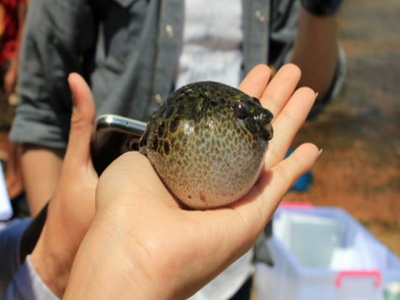Khánh Hoàs company exports puffer fish

The People’s Committee of Khánh Hoà Province has approved Phước Thọ Private Company in Nha Trang for thier harvest, buy, process and export puffer fish.
The goals of the project are to properly manage harvesting and processing, ensure food safety, raise public awareness about the fish, and use chemicals extracted from the fish’s organs for pharmaceutical purposes.
Between 500 and 600 tonnes of puffer fish are expected to be bought in the province annually, and 200-240 tonnes of puffer fish products are slated to be exported, with value of about VNĐ 6 billion (US$ 258,000) annually.
The sale of puffer fish will occur at four ports and be carefully monitored by provincial authorities.
Phước Thọ company will train its staff in puffer fish catching and processing procedures to ensure food safety, including proper sorting and the identification of poisonous and non-poisonous puffer fish.
Fishing vessels will have to be inspected by the provincial Department of Agriculture and Rural Development and provided with a code as part of a supply chain for exported fish. Vessel members will have to be certified for their expertise on puffer fish and cannot consume the fish on board.
Only fish with the proper size and colour specified under prior contracts with buyers will be sold, to either buying vessels or at designated ports.
The puffer fish will be registered and certified, and tested for tetrodotoxin before exporting. In addition, waste processing activities must be safe for surrounding residents and the environment.
The 2004-16 project for exporting puffer fish to Republic of Korea was piloted in five provinces: Hải Phòng, Khánh Hòa, Phú Yên, Bà Rịa – Vũng Tàu and Kiên Giang, according to the Ministry of Agriculture and Rural Development.
All provinces except for Khánh Hoà withdrew from the project because they had problems making a profit from the fish, and many of the fish did not satisfy foreign buyers’demands.
Có thể bạn quan tâm
 Farmers see high profit from crunchy carp farming
Farmers see high profit from crunchy carp farming Fluctuating price and unstable consuming in rice cultivation has made farmers change their direction to qualified seafood.
 Brazil's tilapia boom
Brazil's tilapia boom Brazilian tilapia production grew by 11.9 percent to reach 400,000 tonnes in 2018, according to new statistics.
 Promising forecast for Vietnamese pangasius
Promising forecast for Vietnamese pangasius The implementation of more stringent farming protocols by pangasius producers in Vietnam leaves them well placed to improve the value of their exports